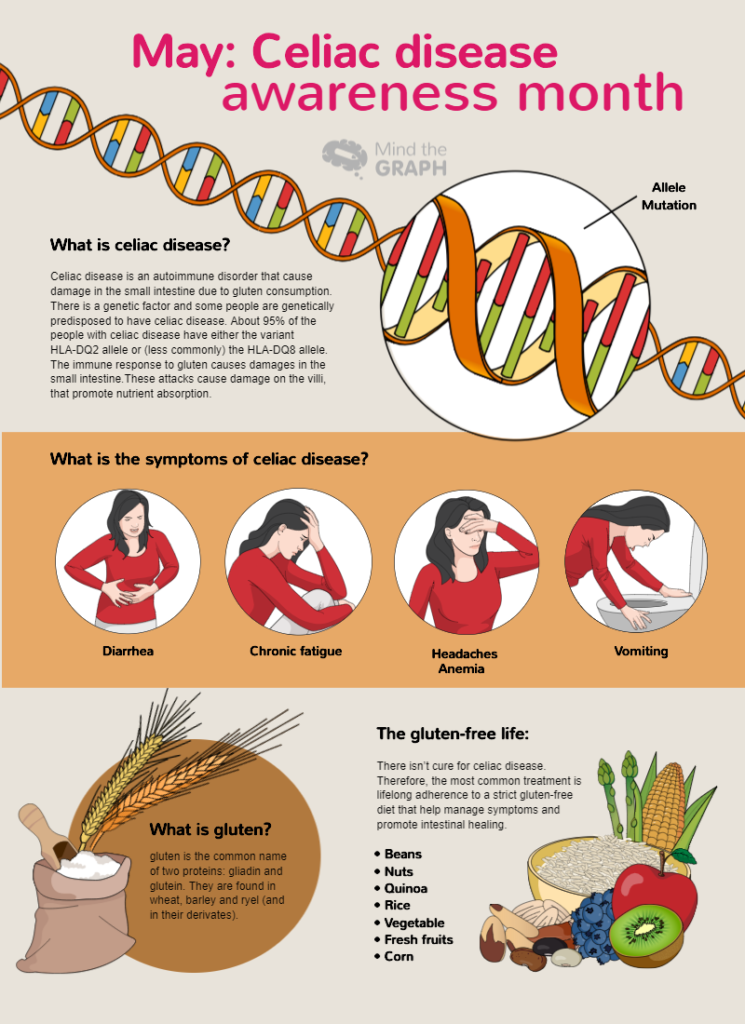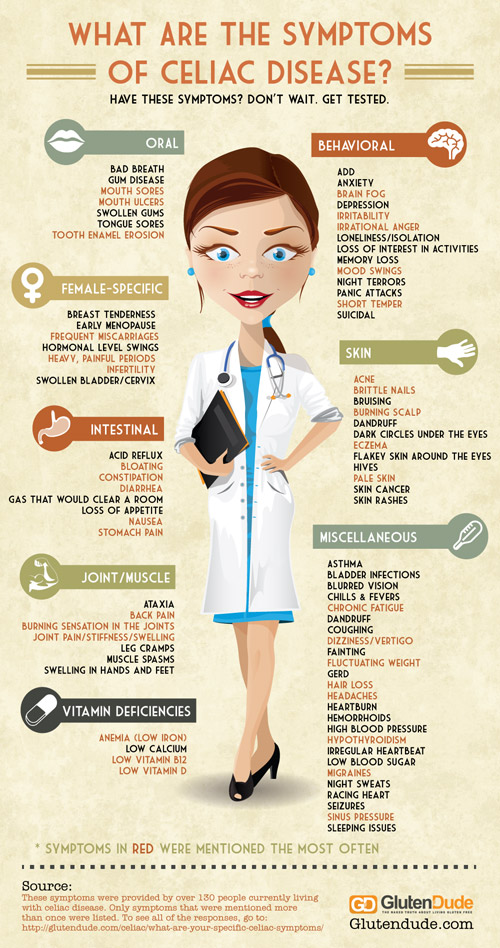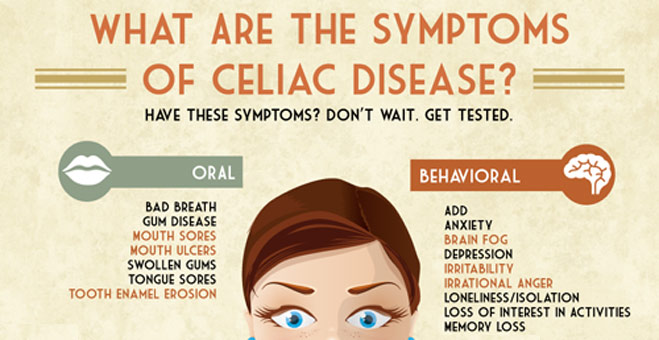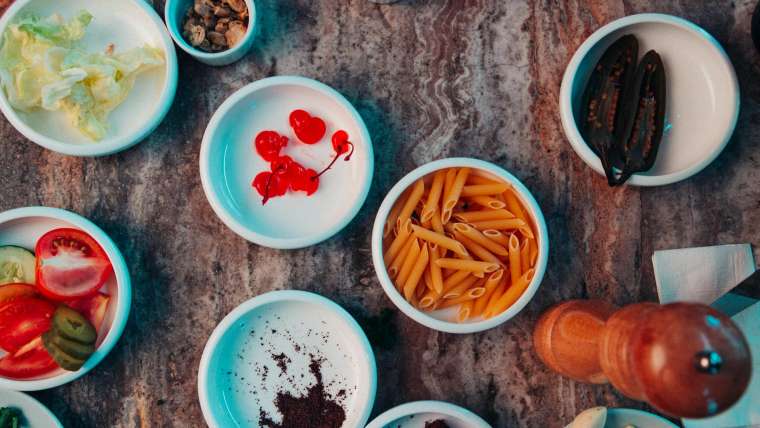Uncover the hidden truths of Celiac Disease – from symptoms to treatment options, this comprehensive guide has all the answers.
Table of Contents
- Introduction: Understanding Celiac Disease
- What Happens Inside Your Body?
- The Main Culprit: Gluten
- Signs and Symptoms to Watch For
- Getting Diagnosed: The Doctor’s Role
- Living Gluten-Free: Changing Eating Habits
- Success Stories: Other Kids with Celiac Disease
- Cool Science Facts about Celiac Disease
- Super Tips for Super Kids
- Life Beyond Gluten: Looking Ahead
- Conclusion: Embracing the Gluten-Free Adventure
- Frequently Asked Questions (FAQs)
Introduction: Understanding Celiac Disease
Have you ever heard of celiac disease? It’s a kind of autoimmune disorder that affects some people. But what does that mean exactly? Let’s break it down in simple terms that you can easily understand.
Meet Celiac Disease
Celiac disease is like having a mix-up in your body. Imagine your immune system, which is like a superhero in your body, protecting you from germs and bad guys. But sometimes, it gets confused and starts attacking the healthy parts of your body instead of the bad stuff. That’s what happens in celiac disease. Your immune system goes into overdrive and attacks your own body, especially when you eat foods with gluten.
What Happens Inside Your Body?
When you have celiac disease, your body’s amazing defense system, called the immune system, gets confused. Instead of protecting you from bad germs, the immune system starts attacking healthy parts of your body. It’s like having an overprotective guard who mistakes friends for enemies!
This mischief causes something called chronic inflammation, which is when parts of your body become red and swollen. Imagine your tummy feeling irritated and cranky all the time. It’s not fun!
The Main Culprit: Gluten
Gluten is the main culprit that causes troubles for people with celiac disease. But what exactly is gluten, and why does it pose a problem for some individuals?

Image courtesy of mindthegraph.com via Google Images
What is Gluten?
Gluten is a protein found in grains like wheat, barley, and rye. You might find gluten in foods like bread, pasta, cookies, and other yummy treats. It’s what gives these foods their chewy texture and helps them hold together.
For kids with celiac disease, gluten is like the bad guy that causes all the trouble. When they eat foods containing gluten, their immune system gets confused and starts attacking the lining of their intestines. This can lead to tummy aches, digestion problems, and other uncomfortable symptoms.
So, while gluten might be delicious for some, for kids with celiac disease, it’s best to steer clear of it to stay healthy and feel good.
Signs and Symptoms to Watch For
Living with celiac disease means being aware of how your body feels and recognizing certain signs that may indicate a problem. Here are some common symptoms to watch out for:
Your Tummy’s Troubles
One of the most noticeable symptoms of celiac disease involves your tummy. If you often feel bloated, have stomach pains, or experience frequent diarrhea, it could be a sign that something isn’t quite right. Pay attention to how your stomach feels after eating different foods, especially those containing gluten.
Getting Diagnosed: The Doctor’s Role
When it comes to understanding celiac disease, doctors play a crucial role in identifying and managing this condition. If you’re experiencing symptoms like stomach pain, bloating, or fatigue, it’s important to seek medical help. Here’s what you can expect when you visit the doctor for celiac disease testing.

Image courtesy of mindthegraph.com via Google Images
A Trip to the Doctor
During your visit, the doctor will listen to your symptoms and may ask about your family’s medical history. They might recommend a blood test to check for specific antibodies that indicate celiac disease. If the results suggest celiac disease, you may need to undergo further testing, such as an endoscopy, to confirm the diagnosis.
Remember, the doctor’s goal is to help you feel better and manage your symptoms. They will guide you through the testing process and discuss treatment options if you’re diagnosed with celiac disease. It’s essential to be honest with your doctor about how you’re feeling so they can provide the best care possible.
Living Gluten-Free: Changing Eating Habits
Living gluten-free means making some changes to the way you eat to keep your body healthy and happy. For kids with celiac disease, following a gluten-free diet is crucial to managing their condition and feeling their best. Let’s explore what it means to switch to gluten-free foods.
What Can I Eat?
When you have celiac disease, you need to avoid foods that contain gluten. This means saying goodbye to many common items like bread, pasta, and cookies that have gluten in them. But don’t worry, there are still plenty of tasty foods you can enjoy! Think fresh fruits and vegetables, meat, fish, eggs, dairy products, and naturally gluten-free grains like rice and corn.
You can also find gluten-free versions of your favorite treats in stores. Look for gluten-free bread, pizza, and snacks that taste just as delicious as the gluten-containing ones. With a bit of creativity, you can cook up yummy and safe meals at home too!
Success Stories: Other Kids with Celiac Disease
Living with celiac disease might sound challenging, but you’re not alone! Many kids just like you are thriving and enjoying life while managing their condition. Let’s hear some inspiring success stories of other children with celiac disease.
| What is Celiac Disease? |
|---|
| Celiac Disease is an autoimmune disorder in which the consumption of gluten triggers an immune response that causes damage to the small intestine. |
| Gluten is a protein found in wheat, barley, and rye. |
| Symptoms of Celiac Disease include diarrhea, fatigue, weight loss, bloating, and nutrient deficiencies. |
| The only treatment for Celiac Disease is following a strict gluten-free diet. |

Image courtesy of glutendude.com via Google Images
Heroes Just Like You
Meet Sarah, a ten-year-old who loves playing soccer and painting. Despite having celiac disease, she doesn’t let it stop her from doing the things she loves. Sarah follows a gluten-free diet and always carries snacks with her to stay energized during games. She shows us that with a positive attitude and a little planning, you can still have fun and be healthy.
Then there’s Alex, who is also eleven and enjoys music and dancing. He was diagnosed with celiac disease last year but didn’t let it dampen his spirit. Alex learned to cook delicious gluten-free meals with his mom and even started a small YouTube channel to share his recipes with other kids like him. His passion for food and creativity shines through, proving that a gluten-free diet can be both tasty and exciting.
And let’s not forget Mia, a twelve-year-old bookworm who dreams of becoming a writer. Mia was diagnosed with celiac disease when she was nine, but she didn’t let it come between her and her dreams. She started a blog where she shares her favorite gluten-free recipes and book reviews. Mia shows us that with determination and a supportive community, you can achieve anything you set your mind to.
Cool Science Facts about Celiac Disease
Here are some cool facts about celiac disease that you might find fascinating!
1. Your body’s immune system is like a superhero that protects you from germs and illnesses. But in celiac disease, this superhero mistakenly attacks healthy parts of your body, thinking they are invaders. It’s like having a superhero with a case of mistaken identity!
2. Scientists have discovered that celiac disease runs in families. If someone in your family has it, there’s a chance you might have it too. But with early diagnosis and the right diet, you can still lead a healthy life.
3. The word “celiac” comes from the Greek word “koiliakos,” which means “suffering in the bowels.” It’s a fitting name because celiac disease can cause a lot of discomfort in your tummy.
4. Your small intestine, where gluten causes all the trouble in celiac disease, is like a super absorbent sponge. It soaks up all the nutrients from your food to keep you healthy. But in people with celiac disease, gluten damages this sponge-like lining, leading to problems with digestion and nutrient absorption.
5. Celiac disease can be challenging to diagnose because its symptoms can mimic other conditions. That’s why it’s essential to listen to your body and talk to a doctor if you suspect you might have celiac disease.
Super Tips for Super Kids
Being a super kid with celiac disease means you have the power to take charge of your health and happiness. Here are some tips to help you navigate the gluten-free world like a champ!

Image courtesy of glutendude.com via Google Images
Being Happy without Gluten
1. Embrace new foods: While your old favorites might contain gluten, there are plenty of delicious gluten-free options to explore. Try out different fruits, vegetables, meats, and dairy products to find new favorites.
2. Get creative in the kitchen: Cooking can be a fun and rewarding activity. Experiment with gluten-free recipes and involve your family in making tasty meals and treats together. You might discover a hidden talent for culinary creations!
3. Share with friends: Let your friends and classmates know about your gluten-free diet. You can teach them about celiac disease and show them that eating gluten-free can still be enjoyable. Who knows, you might even inspire them to try some gluten-free snacks!
4. Stay positive: Remember that celiac disease doesn’t define who you are. Focus on what makes you unique and special, and don’t let your diagnosis hold you back. With a positive attitude and a can-do spirit, you can conquer any challenge that comes your way!
Life Beyond Gluten: Looking Ahead
Living with celiac disease might feel like a big change at first, but there are so many delicious foods you can still enjoy. Embracing a gluten-free diet means exploring new recipes, trying different flavors, and feeling great about taking care of your body.
A Bright Future with Celiac Disease
You are a superhero. Every day, as you make healthy choices and listen to your body, you are showing incredible strength. And guess what? Many famous people have celiac disease and still live amazing lives filled with adventures, laughter, and accomplishments. By taking care of yourself and enjoying the gluten-free foods that make you feel fantastic, you are writing your own incredible success story.
Conclusion: Embracing the Gluten-Free Adventure
What an exciting journey we’ve been on, discovering all about celiac disease and the gluten-free lifestyle! Remember, celiac disease is like your body’s immune system getting mixed up and mistakenly attacking itself. This can cause all sorts of tummy troubles and inflammation that we want to avoid for a healthy life.

Image courtesy of www.pinterest.com via Google Images
Now, let’s talk about gluten – the culprit behind all these issues. Gluten is a sneaky protein found in many foods like bread, pasta, and cookies. By staying away from gluten, we can keep our bodies happy and strong. This means switching to a gluten-free diet filled with yummy alternatives like fruits, veggies, and gluten-free treats!
Living gluten-free doesn’t have to be boring – many kids just like you have found creative ways to enjoy their favorite snacks and meals without gluten. You can still have fun and feel included in all the food adventures!
And guess what? You are not alone in this gluten-free adventure. There are other kids out there who are superheroes just like you, managing celiac disease with courage and a positive spirit. With support and love, you can thrive and live a happy, healthy life.
So, don’t worry about celiac disease holding you back – think of it as a new and exciting path to discovering delicious foods, feeling great, and making wonderful memories. Embrace this gluten-free adventure with open arms and a big smile!
Frequently Asked Questions (FAQs)
Can I still eat my favorite snacks?
Yes, you can still enjoy your favorite snacks even with celiac disease! The trick is to find gluten-free versions of your beloved treats. Many brands now offer gluten-free options for cookies, chips, and candies. So, next time you want a snack, just look for the gluten-free label and indulge without worry!
Will I always have celiac disease?
Having celiac disease means you have to be mindful of what you eat for the rest of your life. While it may sound challenging, remember that sticking to a gluten-free diet can help you stay healthy and happy. By avoiding gluten, you can manage your celiac disease effectively and enjoy a full, active life!





